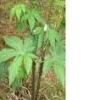 In Japan and China, Ten-Cha is a commonly used complementary alternative medicine for allergic rhinitis.
In Japan and China, Ten-Cha is a commonly used complementary alternative medicine for allergic rhinitis.
Researchers in China studied Ten-Cha (Rubus suavissimus), which is commonly known as either Sweet Tea Extract or Chinese Blackberry Extract.
First, the details.
- 89 people ingested 400 mg of Ten-Cha extract or placebo (3 capsules/day) daily for 4 weeks.
- Evidence of mast cell-stabilizing was measured.
- A nasal allergy diary-based symptom score and a quality of life score were also recorded.
- Neither the patients nor researchers knew the treatment given — double blind.
And, the results.
- The improvement rates for sneeze, nasal discharge, nasal obstruction, and symptom scores were greater in the Ten-Cha group than in the placebo, and the effect tended to increase over time.
- However, the differences between the groups were not significant.
- Ten-Cha didn’t exhibit an effect equivalent to mast cell-stabilizing drugs
- Quality of life was not significantly improved in either group.
The bottom line?
The authors concluded, “Ten-Cha does not exhibit an effect equivalent to mast cell-stabilizing drugs at the dose used in this study.
An earlier study in mice suggested that Rubus suavissimus had potential anti-allergy effects, and the mechanisms might be partly related to an inhibitory effect on the release of histamine from mast cells.
4/24/11 23:24 JR